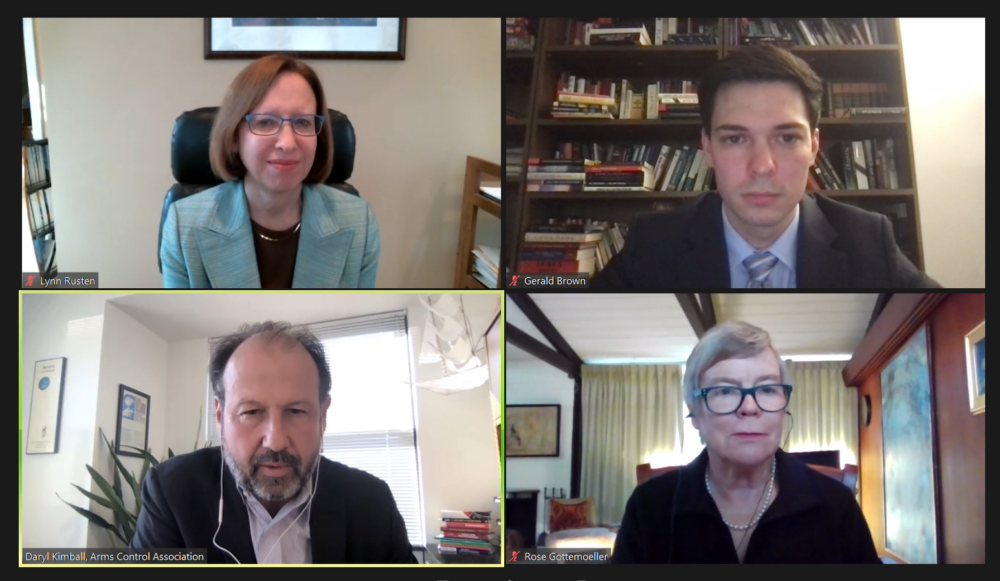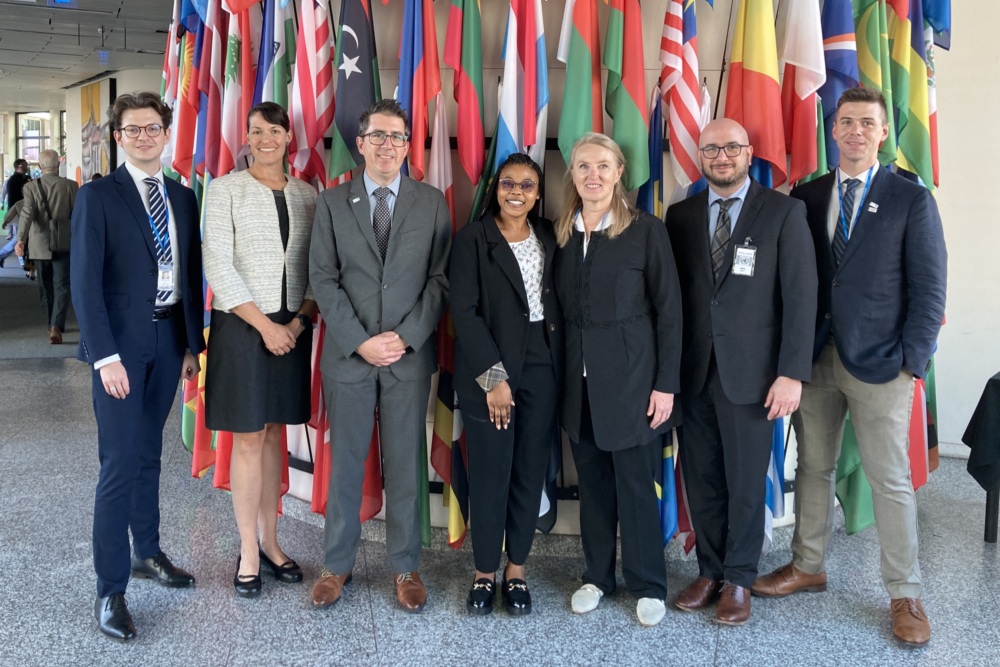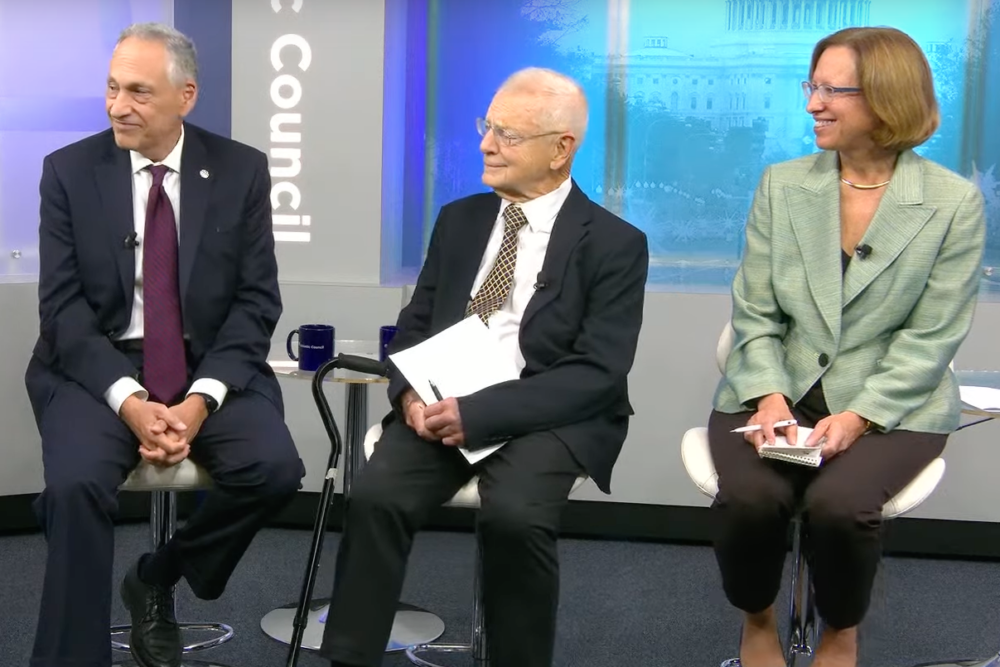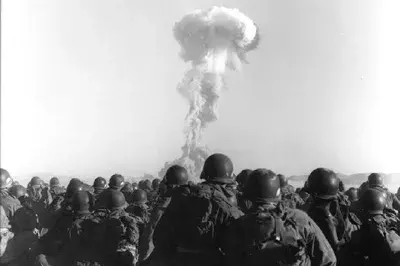
Evaristo Capalla
Intern, Global Nuclear Policy Program
Atomic Pulse
As the Biden administration conducts it review of U.S. nuclear weapons policy scheduled to be completed in early 2022, China appears to be in pursuit of a significant and concerning expansion of the diversity and the size of its nuclear forces. Lynn Rusten, vice president of the Global Nuclear Policy Program at NTI, joined Rose Gottemoeller, former under secretary of State for arms control and international security and NATO deputy secretary general, and Gerald Brown, defense analyst at Valiant Integrated Services, to discuss these developments during a panel discussion hosted by the Arms Control Association (ACA). ACA executive director Daryl Kimball moderated the November 17 panel, which explored the ways in which the U.S. can foster an effective dialogue with China on confidence building measures and nuclear risk reduction.
China’s Nuclear Expansion: Why Now?
Gerald Brown opened the discussion by listing the possible drivers of China’s nuclear expansion and what this means for the Indo-Pacific region at large. He noted that China’s nuclear strategy traditionally has relied on “assured retaliation”—that is, to maintain a minimum deterrent to avoid nuclear blackmail from other countries. But China’s nuclear modernization plans appear to indicate a substantial shift in its strategic thinking. According to Brown, several factors contribute to this shift. One of these is China’s perception that its nuclear arsenal remains extremely vulnerable to U.S. nuclear and conventional weapons, and it is seeking to bolster its assured retaliation capability. He also expressed concern over the impact of China’s nuclear expansion on the Indo-Pacific region. “If China feels more secure with its nuclear capability,” Brown said, it may “feel far more secure in engaging in regional conventional conflicts.” This carries implications for proliferation risks as well. A more assertive China, he argued, could spur other countries in the region to seek their own nuclear deterrent.
There is Time for Diplomacy
Lynn Rusten explained how recent developments in China could impact the Biden administration’s Nuclear Posture Review (NPR) planned for release in early 2022. Recalling the example of U.S.-Soviet Cold War-era nuclear arms competition, Rusten argued that the U.S. response to China’s build-up must have both a diplomatic and a military element, not just the latter. “The United States should pursue a response that is both responsible but also restrained,” she said. While acknowledging that China is undertaking a significant expansion of its nuclear forces, Rusten noted that its arsenal is still far from reaching parity with either the U.S. or Russia. “That means there is time for diplomacy to possibly affect China’s plans,” she added, or “embed them in greater transparency, limits and verification.” Moreover, she said, the U.S. response to Chinese capabilities should not risk undermining the limits set by the New START treaty with Russia, or preclude the U.S. from seeking a successor agreement with Russia that would retain limits at or bring them below New START levels and encompass other nuclear weapons and systems not covered under New START. At the same time, she said, the U.S. should seek a process of serious dialogue and confidence-building measures with China on strategic stability and nuclear risk reduction and, in the longer term, prepare to bring China into a nuclear arms control process, most likely after the next round of bilateral negotiations with Russia. The U.S. also should prudently hedge against a worst-case scenario in which China resists meaningful engagement in these areas. Rusten concluded that the NPR should reaffirm that the current U.S. deterrent is sufficient against both Russia and China, and that the administration would pursue the president’s goals of reducing the role of nuclear weapons and pursuing strategic stability and nuclear risk reduction measures with both countries.
Rose Gottemoeller stressed the need for the U.S. to think hard about the potential for diplomacy and arms control to serve its interests. Because there is time before China could potentially reach nuclear parity with the U.S., both sides should use it to hold serious discussions. “We should use that time to understand each other’s nuclear strategy and force posture,” she said. Patience is key, she stressed, emphasizing that Washington and Moscow took decades before finally agreeing to nuclear arms reduction and verification measures. However, Gottemoeller said there is no need to repeat as lengthy a process with China. “We have too much experience with nuclear diplomacy, even with the Chinese, to necessitate that course,” she emphasized. And while a trilateral framework that includes both Russia and China currently is not possible, Moscow can play a role by holding parallel conversations with Beijing to lay the groundwork.
The Way Forward: Sole Purpose, the 10th NPT Review Conference, and Beyond
After their presentations, panelists took questions from the audience on a range of issues surrounding China’s nuclear buildup. One audience member asked about the ideal framework for carrying forward a strategic stability dialogue with China. Rusten stated that senior-level meetings and direction are very important but added that at the same time, civilian and military experts should be involved to engage in more granular conversations. Gottemoeller agreed, particularly on the importance of military-to-military contacts. Recalling her conversations as Under Secretary with visiting delegations of Chinese early- and mid-career military officers, Gottemoeller added that “you can deliver a lot of messages by answering questions.”
The panelists also were asked questions about specific diplomatic approaches the U.S. should pursue vis-à-vis China. Both Gottemoeller and Rusten stressed the importance of a P5 statement on reaffirming the Reagan-Gorbachev principle – that a nuclear war cannot be won and must never be fought. Such an explicit statement by the P5 for the upcoming Review Conference for the Non-Proliferation Treaty (NPT) would provide a foundation for additional steps. This could include P5 discussions of doctrine and nuclear force modernization, as well as potential nuclear risk-reduction measures. Rusten mentioned that NTI recently published its recommendations for practical steps that states, including the P5, can pursue in the context of the upcoming NPT Review Conference.
Kimball asked the panelists about declaratory policy, noting that as a candidate President Biden expressed his view that the U.S. should work toward declaring that the “sole purpose” of nuclear weapons is to deter a nuclear attack against the U.S. or its allies. Brown said the Biden administration should consider how it can push China to have a deeper conversation about nuclear declaratory policy. Rusten offered that proactively leading and reassuring allies with the goal of embracing sole purpose would benefit the interests of the U.S. and its allies because it would not benefit our mutual security to initiate nuclear use. While the risks of nuclear use globally are growing, there is considerable complacency and underappreciation of, for instance, cyber-nuclear dangers at a time of major tensions in the Indo-Pacific and the Euro-Atlantic. According to Rusten, having a declaratory policy that clearly states and narrows the circumstances for U.S. nuclear use would reduce tensions, set a strong example and signal, and make the U.S. deterrent more credible.
Watch the ACA seminar below or here.
Sign up for our newsletter to get the latest on nuclear and biological threats.
Lynn Rusten, vice president of NTI’s Global Nuclear Policy Program, shares her reaction to the 2023 Strategic Posture Report during a panel event at the Atlantic Council.
There is no noise at first, only a flash so bright that the soldiers see their own bones and blood vessels through their skin, as if they have x-ray vision.



